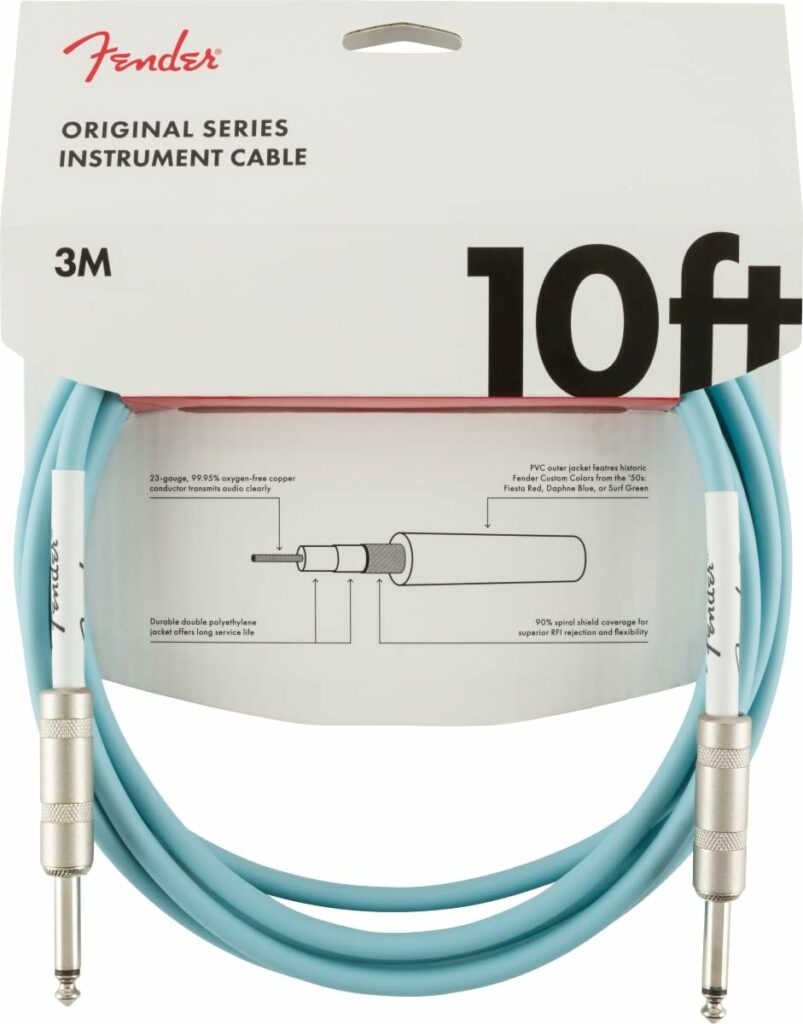Is It Worth Buying Expensive Guitar Cables? A Tone-Chaser’s Honest Guide
Every guitarist faces this dilemma at some point: Should I splurge on a premium guitar cable, or will a budget option do the job? With prices ranging from 10to10to200+, the choice isn’t always clear. Some swear that expensive cables transform their tone, while others call it snake oil.
The truth? It depends. Expensive cables can make a difference—but only in specific scenarios. In this guide, we’ll break down when they’re worth the investment, when they’re overkill, and how to decide what’s right for your playing style, rig, and budget.
What Makes a Guitar Cable “Expensive”?
Before judging value, let’s dissect what you’re paying for:
1. Materials
- Conductors: Premium cables use oxygen-free copper (OFC) or silver-plated copper for minimal signal loss.
- Shielding: High-end brands like Mogami or Evidence Audio use dual-layer shielding (braided copper + foil) to block interference.
- Connectors: Neutrik or Switchcraft plugs (gold-plated, with strain relief) ensure durability and clean signal transfer.
2. Construction
- Low Capacitance: Expensive cables often have capacitance below 30pF/ft, preserving high-end clarity.
- Flexible Jackets: Slim, lightweight designs reduce tangling on pedalboards.
- Hand-Soldered Joints: Precision assembly minimizes weak points.
3. Brand Reputation
Companies like Pete Cornish or Analysis Plus charge a premium for R&D and artist endorsements (e.g., David Gilmour’s Cornish cables).
The Pros and Cons of Expensive Guitar Cables
✅ The Benefits
- Better Tone Preservation
Low-capacitance cables retain high frequencies, critical for sparkly cleans and articulate high-gain leads. Tests show cheap cables can lose up to 20% of high-end clarity over 20 feet. - Noise Reduction
Premium shielding blocks hum from LEDs, Wi-Fi, and dimmer switches—a lifesaver in noisy venues or studios. - Durability
Reinforced connectors and abrasion-resistant jackets survive years of gigging. Brands like Van Damme offer lifetime warranties. - Consistency
High-end cables behave predictably across different rigs, unlike budget cables that may vary in quality.
❌ The Drawbacks
- Diminishing Returns
A 150cableisn’t10x“better”thana150cableisn’t10x“better”thana50 one. Past a certain point, improvements become subtle. - Overkill for Simple Setups
If you play a short cable into a practice amp, a $10 cable might suffice. - Risk of Theft/Loss
Touring musicians often avoid pricey cables for fear of losing them.
When Are Expensive Cables Worth It?
1. You’re Recording in a Studio
Studio engineers demand pristine signal chains. A Mogami Gold or Evidence Audio SIS cable ensures your guitar’s true tone hits the DAW.
2. You Use a Long Signal Chain
Pedalboards with 10+ pedals compound capacitance. Low-capacitance cables (e.g., George L’s) prevent muffled tones.
3. You Play High-End Gear
Pairing a 3,000guitarwitha3,000guitarwitha20 cable is like putting cheap tires on a Ferrari. Premium cables unlock your gear’s potential.
4. You Gig Frequently
Durability matters when you’re plugging/unplugging nightly. A fraying $30 cable failing mid-show isn’t worth the risk.
When to Stick with Budget Cables
1. You’re a Bedroom Player
If you’re practicing in a noise-free room with short cable runs, a Fender Deluxe or Ernie Ball Flat Ribbon will work fine.
2. You’re on a Tight Budget
Prioritize gear that directly shapes tone (pickups, pedals, amps) first. Upgrade cables later.
3. You Use Wireless Systems
Wireless rigs negate cable tone issues. Save your cash here.
4. You Play Vintage-Style Tones
High-capacitance cables (like Jimi Hendrix’s coiled cords) intentionally darken tone. A cheap cable might nail that vibe.
Expensive vs. Budget Cables: A Side-by-Side Comparison
| Factor | Expensive Cable | Budget Cable |
|---|---|---|
| Tone Clarity | High-end sparkle, minimal loss | Slightly muffled highs |
| Noise | Near-silent in noisy rooms | Prone to hum/interference |
| Durability | Lasts 10+ years with care | Frays/breaks in 1–3 years |
| Capacitance | 20–30pF/ft (ultra-low) | 50–100pF/ft (moderate-high) |
| Price | 80–80–200+ | 10–10–50 |
The Sweet Spot: Mid-Tier Cables
If you’re unsure, mid-tier cables (50–50–80) strike a balance:
- Van Damme Blue Series: Studio-grade shielding at a live-musician price.
- Ernie Ball Flat Ribbon: Tangle-free, gold connectors, and rugged for gigging.
- Planet Waves American Stage: Eco-friendly and reliable with a mute switch.
These offer 90% of premium performance for 50% of the cost.
FAQs About Expensive Guitar Cables
Q: Can a bad cable really ruin my tone?
A: Yes. High capacitance and poor shielding can dull your sound and add noise—even with great gear.
Q: Do expensive cables last longer?
A: Typically. Neutrik connectors and reinforced jackets withstand more abuse than plastic-ended budget cables.
Q: Are “boutique” cables worth it?
A: Only if you need custom lengths or ultra-low capacitance (e.g., Pete Cornish for massive pedalboards).
Q: How do I test a cable’s quality?
A: Plug in and listen for high-end loss. Wiggle the connectors to check for crackling.
The Verdict: Should You Buy an Expensive Cable?
- Worth It If: You record professionally, gig regularly, or use high-end gear.
- Not Worth It If: You play casually, use wireless, or prefer vintage-style tone darkening.
If you’re still unsure, borrow a premium cable and A/B test it with your current one. The difference may surprise you.
Pro Tips for Smart Cable Shopping
- Buy Used: High-end cables often resell for 50% off on Reverb or eBay.
- Prioritize Warranty: Brands like Mogami offer lifetime guarantees.
- Start with One: Replace the cable between your guitar and pedalboard first—it impacts tone most.

